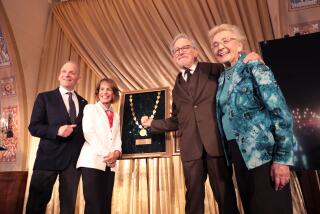Meeting Focuses on Ways to Combat Racism
- Share via
Hate crimes, discrimination and human rights atrocities were among the issues tackled by participants in a workshop Saturday at USC in preparation for a global summit against racism.
It was the fourth preparatory meeting for the United Nations World Conference Against Racism, Racial Discrimination, Xenophobia and Related Intolerance, scheduled for Aug. 31 to Sept. 7. in Durban, South Africa.
Resolutions to be recommended to the U.N., which could affect how international law is enforced, will be decided at the Durban conference.
The Southern California gathering was part of a series of meetings held in cities throughout the world to solicit public input. The feedback will help officials draft the conference agenda.
Recommendations from a wrap-up plenary discussion will be also passed on to conference officials from the United Nations.
The recommendations have not been finalized, but suggested ones include:
* Developing age-appropriate education about other cultures for children and adults.
* Repealing ordinances that discriminate against day laborers and typically affect immigrant workers.
* Combating media stereotypes with coalitions of media, civil rights, human relations and other groups.
“What it means for recommendations coming from this country--and Los Angeles especially, which is so diverse--is that people will read it with particular interest,” said Elsa Stamatopoulou, deputy director for the U.N. High Commissioner for Human Rights in New York.
The event was hosted by the Los Angeles County Human Relations Commission and included panel discussions that addressed racism and discrimination in the media, neighborhoods, schools and the workplace.
Participants included Canadian Secretary of State Hedy Fry, Fernando Herrera of the Department of Protection for the Mexican consulate, Chris Camonovo of the U.S. State Department, and journalist and author Ellis Cose.
Although this year’s meeting will be the third U.N. conference on racism, officials said, it will be the first in which the United States has participated.
A task force will soon select a delegation to represent the United States at the summit, said Debra Carr, who heads the task force.
“This is going to be a very diverse delegation,” Carr said. “It’s going to represent the diversity that this president has shown in selecting his Cabinet.”
In the United States, government and nongovernmental groups agree “that racism is a local problem that can no longer be ignored on a global level,” said Elizabeth Seji-Min, of the U.S. Nongovernmental Organization Coordinating Committee.
“Most of the issues we see that have to do with how racism intersects with social institutions are front burner issues,” she added.
One point of contention between private organizations and the United States and European governments, conference attendees said, is whether “compensatory measures” to remedy past human rights violations should be included in official recommendations to the U.N. panel.
The issue was discussed at a previous preparatory conference in Geneva, but no consensus was ever reached, officials said.
If included, the measure would refer to reparations for groups such as African Americans and to countries that were once colonized.
Carr declined to commit because the U.S. has not yet taken an official position on the matter, she said.
More to Read
Sign up for Essential California
The most important California stories and recommendations in your inbox every morning.
You may occasionally receive promotional content from the Los Angeles Times.













